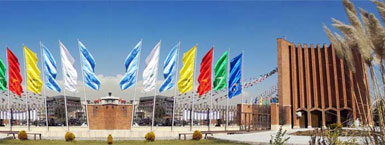.:: Ph.D::.
Computer Engineering
Introduction
The Ph.D. program in computer engineering represents the pinnacle of education in computer studies. The Computer System Architecture Department collaborates with the Computer Engineering Department to admit students through the national doctoral entrance exam and directly admits talented students through interviews. This program aims to cultivate graduates who deeply understand the latest scientific advancements in their fields of expertise. These graduates are equipped to devise innovative solutions supported by rigorous scientific evaluation, even when there is no solution to design or implement a computer system. The Ph.D. degree, akin to the M.Sc., comprises educational and research components. The doctoral program courses are shared with the courses offered in the master?s program and are determined at the supervisor?s discretion.
.:: MS.c.::.
Cybersecurity (Secure Computing)
Introduction
Security and privacy are paramount concerns in today?s information technology
and network systems. With the ubiquitous reach of the Internet, many public and
private services are now operating within this interconnected network. By exploiting
vulnerabilities in remote systems, malicious actors can inflict irreparable financial,
political, or security harm upon a nation. Moreover, the country?s critical industries
and infrastructures increasingly rely on network control. Exploiting weaknesses
in these systems could potentially paralyze factories, cities, or even the entire
nation.
The cybersecurity program is meticulously crafted to equip academic professionals
with the skills needed to secure systems and combat security threats. Students learn
the principles of establishing security within software and hardware systems and
mastering techniques to safeguard information security and user privacy. Additionally,
they gain expertise in network security assessment, bolstering their ability to
ensure robust protection and security.
One of the notable activities carried out in the Computer System Architecture Department
is hosting an annual Capture the Flag (CTF) competition on an international scale.
Simultaneously, the APA (Computer Awareness, Support, and Assistance) laboratory,
established in collaboration with the Information Technology Organization of Iran,
tackles the nation?s cybersecurity challenges by leveraging the resources available
within the university.
Students and researchers in this department employ cutting-edge techniques, including
deep learning, reinforcement learning, and other machine learning and artificial
intelligence (AI) techniques in cybersecurity. Additionally, they explore emerging
technologies such as blockchain and cryptocurrencies. Some research areas in this
program are as follows:
Network security and intrusion detection
Detection of software vulnerabilities
Detection of hardware Trojans
Malware analysis
Trust and privacy management
Security of distributed systems, Internet of Things (IoT), and cloud systems
E-commerce security, cryptocurrencies, and the use of blockchain technology in different
applications
Application of artificial intelligence (AI) algorithms in the mentioned fields
Computer System Architecture
Introduction
The escalating demand for computer systems across diverse domains underscores
the critical research challenges in computer system architecture. These challenges
encompass achieving higher efficiency, minimizing the required physical storage,
reducing power consumption, and fortifying against security threats. In recent years,
the advent of transformative technologies?such as the Internet of Things (IoT) and
cloud computing?has intensified the urgency for more efficient computing algorithms
and architectures.
The computer system architecture program, guided by its commitment to addressing
the aforementioned challenges, encompasses education, research, and industrial endeavors
related to computer systems across various tiers?ranging from the intricate transistor
level to the broader realms of system and network levels. Some research areas in
this program are as follows:
Computer networks, cloud computing, edge computing, and the Internet of Things (IoT)
Embedded, approximate, and neuromorphic computing systems
Evaluation and management of efficiency, temperature, and energy consumption in
computer systems
Security and trust in hardware, detection of hardware Trojans
Hardware implementation of cryptographic algorithms
Reconfigurable systems and FPGA architectures
Reliability and design of fault-tolerant systems
Automation methods in the design and synthesis of digital systems with CAD tools
Application of artificial intelligence (AI) algorithms in the mentioned fields
Digital Forensics
Introduction
As electronic tools become increasingly integral for providing and accessing
financial, government, and social network services, alongside the expanding cyber
activities of companies and organizations, the potential for these tools to be misused
in various crimes?both cyber and non-cyber?has also risen. Consequently, relying
solely on traditional evidence in judicial cases is no longer sufficient and digital
evidence must also be thoroughly examined.
Digital forensics is an interdisciplinary field that focuses on acquiring, identifying,
documenting, and analyzing digital evidence. This discipline has been offered by
prominent universities worldwide since the late decade. Tarbiat Modares University
pioneered this field in Iran through an interdisciplinary master?s program managed
by the Computer System Architecture Department (within the Faculty of Electrical
and Computer Engineering) in collaboration with the Faculty of Law. Admission to
this program is based on entrance exams. It is open to graduates in computer engineering
or related fields, adhering to the criteria set forth by the Ministry of Science,
Research, and Technology.
Digital forensics courses introduce students to the principles and technical intricacies
of acquiring, identifying, documenting, and analyzing digital evidence. Simultaneously,
they delve into domestic and international legal considerations. As a result, graduates
in this field acquire the essential knowledge and skills to lead or collaborate
with research teams focused on cyber-attacks and crimes. These competencies find
application in various professional jobs:
Private companies (particularly those engaged in information and communication technology)
Government organizations and institutions (including national or local CERTs, information
technology organizations, and network security units within government and private
organizations and institutions)
Judicial and police institutions
Advanced roles (such as developing digital forensics software, verifying existing
software, and managing cyberspace security)
|




